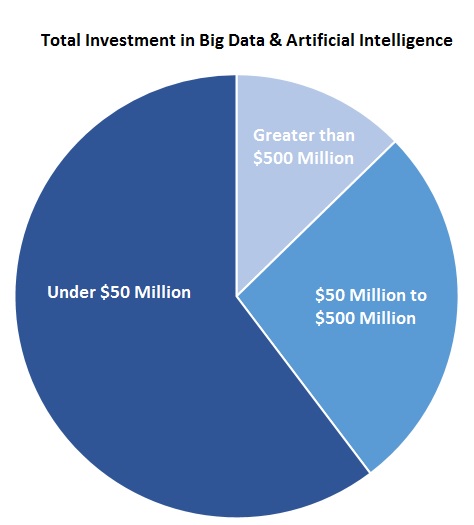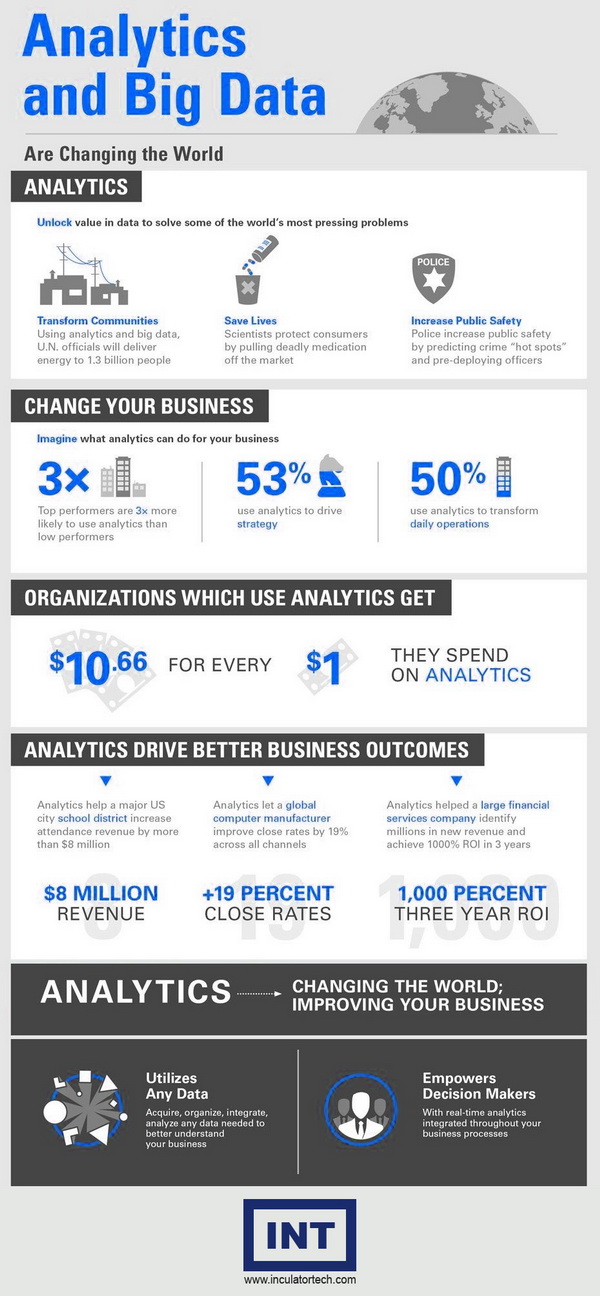Big Data & Measurable Analytics Helps to Improve Collaboration and Engagement for Business
Since the rise of research marketing in the start of 21st century, marketers’ skills to track digital spend has grown progressively sophisticated. Yet even though accountability has improved across almost all channels and devices, the customer journey has become more difficult. Proper attribution is now a constant pain point for marketers who are struggling to discover which channels generate ROI. Team collaboration has also taken team managers’ thoughts worldwide. As companies expect that working as a team will bring multiple benefits to the company or business, they keep implementing relevant tools and spread collaboration-centric cultures. This group effort fashion has made the teamwork more transparent and facilitated the team management. Recently, a survey was conducted related to Big Data, Artificial intelligence and its implementation in different businesses. In that survey, they found that how executives in large organizations view the data. Each year the response rate increases, and the reported importance and urgency of making effective use of data increases as well.
Businesses Investing in Big Data & AI:
According to the reports and different surveys, Firms are actively investing in building or launching Big Data and AI initiatives. In the results, 97.2 % of respondents showed that their company is investing in Big Data and AI. A contributing and most important factor in the growth of investment ranks in Big Data and AI is the proliferation of data volumes and foundations that are empowering AI and cognitive learning initiatives. More than 75% of respondents specified that the availability of larger and more frequent sets of data was driving AI and cognitive learning investments. In spite of the extensive investment in Big Data and AI, overall investment levels remain relatively moderate. Following are the outcomes of the level of investments made:  This confirms one thing, that while investment in Big Data and AI initiatives appear to be widespread, investment levels continue to appear to be relatively modest for most organizations at this time. According to Study at Harvard University, this continuing rise in the significance and challenges of big data is one of the most vital features of present-day economy and society. The survey results over time provide interesting and valuable documentation of this revolution. The rise of Artificial Intelligence is only exacerbating this trend. The keys to success are to decide how your company should respond, assign clear responsibilities for data strategy and results, and then move ahead to execute the needed changes in a systematic and effective fashion.
This confirms one thing, that while investment in Big Data and AI initiatives appear to be widespread, investment levels continue to appear to be relatively modest for most organizations at this time. According to Study at Harvard University, this continuing rise in the significance and challenges of big data is one of the most vital features of present-day economy and society. The survey results over time provide interesting and valuable documentation of this revolution. The rise of Artificial Intelligence is only exacerbating this trend. The keys to success are to decide how your company should respond, assign clear responsibilities for data strategy and results, and then move ahead to execute the needed changes in a systematic and effective fashion.
The Right Analytics Can Strengthen Customer Engagement and Team Collaboration
Customer engagement is where every organization’s heart exists. Data-driven strategies help industry leaders to increase their market growth while shaping customer satisfaction. There is a saying
“The Most Important Key to a Better Analytics Strategy Is Collaborative Business Intelligence ”
High-performing companies encourage collaboration among their analytics, Information technology, and all other lines of business departments. Without ongoing communication between these organization’s contenders, misunderstandings arise about the allocation of budget and company data is used ineffectively and highly inefficiently. Make sure departments are working together, by giving these all parties a seat at the table to sit together with the help of Technology and sharing of Data.
Some of the Key findings from last year’s research are the following:
Competitive advantage from analytics continues to grow
More than 60 percent of managers say their company is using data analytics to gain a competitive advantage over other companies and brands. This is a higher percentage of respondents than in the previous few years.
Analytics is creating customer engagement
Organizations that demonstrate higher levels of analytical maturity saw a clear advantage in their customer relationships. And this has improved dramatically in a few years. The most analytically established organizations are twice as likely to report robust customer engagement as the least analytically developed organizations.
Analytically advanced organizations consume more data sources to engage customers
Many organizations are already making use of data from customers, vendors, regulators, and competitors, but Analytical Innovators are more than four times more likely to gather data from all four sources. They also are much more likely to use distinct and unique types of data — such as mobile, social, and public data — to engage customers compared with less analytically mature organizations. Sharing data can improve encouragement and influence with customers and other groups. Sharing data doesn’t mean giving away the firm. Organizations that share their information and data with others (customers, government agencies, vendors and even with competitors) reported increased impact and influence with members of their overall network. When we see this in a broader sense, sharing of data can enhance a company’s influence with not only customers but also a broad array of other stakeholders who are the lifeline for any business.
Collaborate to set data-driven goals
Ask yourself a few important questions. 1. What is your first priority? 2. Are you looking for an Increased ROI? 3. Are you stronger at the allocation of your business’s budget? 4. Does your current system is lifting Customers high and satisfying them? Identify the anticipated end result, and distribute it to all relevant parties. Everyone stakeholder should know accurately what he or she is working toward to make collaboration more efficient. We at Inculator Tech, for instance, prioritize developing strong products so our clients can successfully improve their businesses. The whole team at Inculator Tech knows that everyone is determined for the same goal.  At Inculator Tech also ensures you’re making good use of your data. Most companies know data is the key to not only growing their businesses but also a key to success for their long life in their industry, but they aren’t always positive the way to use that data and information which they’ve collected. Knowing your KPIs provides direction and focus to your business. Make sure you’re conveying genuine problems with those KPIs; just because the rest of your industry is using analytics a certain way doesn’t mean it’s the right move for your company. Work with your data analysts and IT leaders to interpret the data you collect. Otherwise, you end up zeroing in on trends that don’t exist and problems that aren’t really there (while missing data points that really matters). According to a surveying firm, it is found that among the firms it surveyed, a mere 29 percent successfully implemented analytics in their strategies. Collaboration helps you avoid costly mistakes. Marketing, Finance, IT, Human Resource and all other departments depend on one another, and that relationship creates exciting opportunities for innovation and creative problem-solving. When CMOs, CFOs, CTOs and their teams engage with other stakeholders, their analytics take on new meanings and they’re better able to serve their companies and shape their brands and its image.
At Inculator Tech also ensures you’re making good use of your data. Most companies know data is the key to not only growing their businesses but also a key to success for their long life in their industry, but they aren’t always positive the way to use that data and information which they’ve collected. Knowing your KPIs provides direction and focus to your business. Make sure you’re conveying genuine problems with those KPIs; just because the rest of your industry is using analytics a certain way doesn’t mean it’s the right move for your company. Work with your data analysts and IT leaders to interpret the data you collect. Otherwise, you end up zeroing in on trends that don’t exist and problems that aren’t really there (while missing data points that really matters). According to a surveying firm, it is found that among the firms it surveyed, a mere 29 percent successfully implemented analytics in their strategies. Collaboration helps you avoid costly mistakes. Marketing, Finance, IT, Human Resource and all other departments depend on one another, and that relationship creates exciting opportunities for innovation and creative problem-solving. When CMOs, CFOs, CTOs and their teams engage with other stakeholders, their analytics take on new meanings and they’re better able to serve their companies and shape their brands and its image.

